
Lincolnshire is a county in the East Midlands of England, with a long coastline on the North Sea to the east. It borders Norfolk to the south-east, Cambridgeshire to the south, Rutland to the south-west, Leicestershire and Nottinghamshire to the west, South Yorkshire to the north-west, and the East Riding of Yorkshire to the north. It also borders Northamptonshire in the south for just 20 yards (19 m), England's shortest county boundary. The county town is the city of Lincoln, where the county council has its headquarters.

Grantham is a market and industrial town in the South Kesteven district of Lincolnshire, England. It straddles the London–Edinburgh East Coast Main Line and the River Witham and is bounded to the west by the A1 north–south trunk road. It lies about 23 miles south of the county town, Lincoln, and 22 miles east of Nottingham. The population in 2016 was put at 44,580. Grantham is known as the birthplace of former UK Prime Minister Margaret Thatcher, for educating Isaac Newton at the King's School, as the workplace of the UK's first female police officer, Edith Smith in 1914, and for making the UK's first running diesel engine in 1892 and tractor in 1896. Thomas Paine worked there as an excise officer in the 1790s.
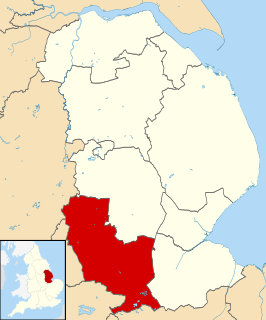
South Kesteven is a local government district in Lincolnshire, England, forming part of the traditional Kesteven division of the county. It covers Grantham, Stamford, Bourne and Market Deeping. The 2011 census reports 133,788 people at 1.4 per hectare in 57,344 households.
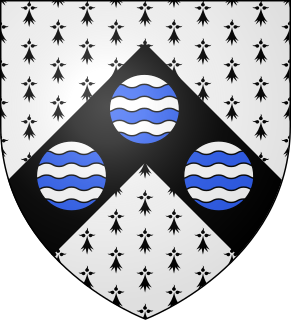
Baron Brownlow, of Belton in the County of Lincoln, is a title in the Peerage of Great Britain. It was created in 1776 for Sir Brownlow Cust, 4th Baronet. The Cust family descends from Richard Cust (1622-1700) of The Black Friars, Stamford, who represented Lincolnshire and Stamford in Parliament. In 1677 he was created a baronet, "of Stamford in the County of Lincoln". He was succeeded by his grandson Richard Cust, 2nd Baronet, who married Anne Brownlow, daughter of Sir William Brownlow, 4th Baronet, "of Humby", Lincolnshire, and sister and sole heiress of John Brownlow, 1st Viscount Tyrconnel, 5th Baronet of Belton House, Lincolnshire. The 2nd Baronet's son Sir John Cust, 3rd Baronet, sat as a Member of Parliament for Grantham and served as Speaker of the House of Commons from 1761 to 1770 and in 1754 inherited the Brownlow estates, including Belton, on the death of his childless maternal uncle Viscount Tyrconnel. His son Brownlow Cust, 4th Baronet represented Ilchester, Somerset, and Grantham in Parliament and in 1776 was raised to the peerage as Baron Brownlow, "of Belton in the County of Lincoln", chiefly in recognition of his father's services. He was succeeded by his son John Cust, 2nd Baron Brownlow who had sat as a Member of Parliament for Clitheroe, Lancashire, and also served as Lord Lieutenant of Lincolnshire for many years. In 1815 he was created Viscount Alford, "in the County of Lincoln" and Earl Brownlow both in the Peerage of the United Kingdom. In 1810 the future 1st Earl had married Sophia Hume, a daughter of Sir Abraham Hume, 2nd Baronet, of Wormleybury, by his wife Lady Amelia Egerton, a great-granddaughter of John Egerton, 3rd Earl of Bridgewater.
Lincolnshire is a large county in England with a sparse population distribution, which leads to problems funding all sorts of transport. The transport history is long and varied, with much of the road network still based on the Roman model, and the once extensive rail network a shadow of its former self.

Ropsley is a village in the South Kesteven district of Lincolnshire, England. The village is situated approximately 5 miles (8 km) east from Grantham, and falls within the civil parish of Ropsley and Humby.

Braceby and Sapperton is a civil parish in the South Kesteven district of Lincolnshire, England. According to the 2001 census it had a population of 47. The parish consists of the two small villages of Braceby and Sapperton. Each village contains a small church dating from the 12th or 13th century.
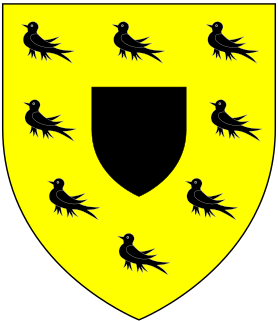
Viscount Tyrconnel was a title in the Peerage of Ireland. It was created in 1718 for Sir John Brownlow, 5th Baronet, Member of Parliament for Grantham and Lincolnshire. He was made Baron Charleville, in the County of Cork, at the same time, also in the Peerage of Ireland. The Brownlow Baronetcy, of Humby in the County of Lincoln, was created in the Baronetage of England on 27 July 1641 for William Brownlow. His grandson, the third Baronet, represented Grantham in Parliament. The latter had no surviving male issue and was succeeded by his younger brother, the fourth Baronet. He sat as Member of Parliament for Peterborough and Bishop's Castle. He was succeeded by his son, the aforementioned fifth Baronet, who was elevated to the Peerage of Ireland as Viscount Tyrconnel. The three titles became extinct on Lord Tyrconnel's death in 1754. The Brownlow estates were passed on to the late Viscount's nephew, Sir John Cust, 3rd Baronet, whose son was created Baron Brownlow in 1776.

John Brownlow, 1st Viscount Tyrconnel, KB, known as Sir John Brownlow, 5th Baronet, from 1701 to 1718, of Belton House near Grantham in Lincolnshire, was a British politician who sat in the House of Commons from 1713 to 1741.

Sir John Brownlow, 3rd Baronet of Belton House near Grantham in Lincolnshire, was an English Member of Parliament. He built the grand mansion of Belton House, which survives today.
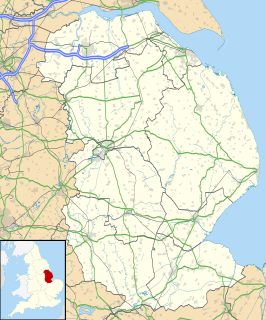
Little Humby is a hamlet in the South Kesteven district of Lincolnshire, England. It lies in the civil parish of Ropsley and Humby, 5 miles (8.0 km) east from Grantham, 1 mile (1.6 km) south-east from Ropsley and 1.5 miles (2.4 km) south from the A52 road. Great Humby, a smaller hamlet, is 720 yards (658 m) to the south. It is in the civil parish of Ropsley and Humby.

Great Humby is a hamlet in the South Kesteven district of Lincolnshire, England. It lies in the civil parish of Ropsley and Humby, 6 miles (9.7 km) east from Grantham, 1.5 miles (2.4 km) south-east from Ropsley and 3 miles (4.8 km) south from the A52. Little Humby, a larger hamlet, is 720 yards (658.4 m) to the north. It is in the civil parish of Ropsley and Humby.
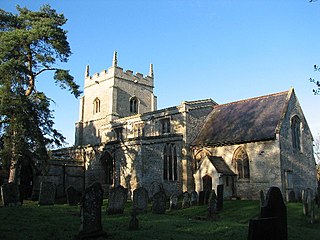
Ingoldsby is a small village in the South Kesteven district of Lincolnshire, England. It is situated 7 miles (11 km) south-east from the market town of Grantham, 32 miles (51 km) south of the county town of Lincoln, and 33 miles (53 km) east of the City of Nottingham. The village contains approximately 121 households.
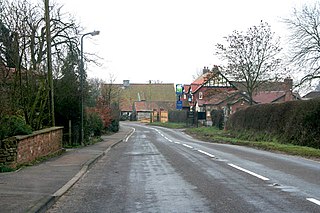
Old Somerby is a village and civil parish in the South Kesteven district of Lincolnshire, England, 3 miles (5 km) south-east of Grantham. It lies on the B1176 road, the village centre being about 1 mile (1.6 km) east of its junction with the A52 and B6403, and adjacent to the East Coast Main Line.
Winnibriggs and Threo was an anciently established wapentake in the Parts of Kesteven, the south-east division of the English county of Lincolnshire. Most of the administrative functions of the wapentake had been lost to other local units of government by 1832.
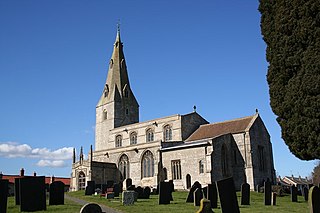
St Peter's Church is a Grade I listed Anglican parish church dedicated to Saint Peter, in Ropsley, Lincolnshire, England. The church is 5 miles (8 km) east from Grantham, and in the South Kesteven Lincolnshire Vales. St Peter's is in the ecclesiastical parish of Ropsley, and is part of the North Beltisloe Group of churches in the Deanery of Beltisloe, and the Diocese of Lincoln.

Ropsley and Humby is a civil parish in the South Kesteven district of Lincolnshire, England. According to the 2001 Census it had a population of 808, increasing to 816 at the 2011 census. The parish consists of the small villages of Ropsley and Great Humby and the larger Little Humby, and the Deserted Medieval Villages of Overton Green and Ogarth.

Sir John Brownlow, 1st Baronet of Belton, near Grantham in Lincolnshire, was Sheriff of Lincolnshire in 1640. on 26 July 1641 was created a baronet "of Belton in the County of Lincoln". He died without progeny when his baronetcy became extinct. His monument survives in Belton Church, showing half statues of himself and his wife finely sculpted in white marble.












